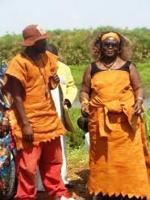Tanzania Religion in Africa
Tanzania Religion and beliefs follow in different categories. Although less data is compiled about religion in Tanzania, this site has got some decisive information about faith sects in Tanzania. Tanzania has been a place of people of many culture and religion from many countries. Tanzania Religion has its roots in earlier times. Almost one-third of the Tanzanian people are Muslims
Another one third are Christians and the remaining one third follow religions of different kind. Some rural people in Tanzania are believers of animistic religion. Religion in Tanzania is multifaceted.
The Muslims in Tanzania are descendants of Aga Khan's spiritual leadership. There are sprouts of Jainism, Hinduism, Roman Catholicism, too.
Though the constitution offers freedom of religion, in reality, there are some shortcomings observed. Fundamentalists are also there. Tanzanian culture is highly influenced by Tanzanian Religion.
Zanzibar in Tanzania has got more hold of Muslims. Almost 99 percent of the population there are Muslims. Clashes and tensions between Christianity and Muslim culture are always there. It has its fatal effects in schools, colleges, offices, business places, even in places of travel, too.
Missionaries have to get the permission to preach in Tanzania. In Tanzania Religion, people of any religion are permitted to leave the country for religious practices and pilgrimages. Many organizations have been found to enforce the rituals and procreate the same among own and different culture, too. Though, tourism in Tanzania has shaded the country with the touch of global openness, concept of secularism in actual is far away.
Current statistics on religion in Tanzania are unavailable because religious surveys were eliminated from government census reports after 1967.Religious leaders and sociologists estimate that the Christian and Muslim communities are approximately equal in size, each accounting for 30 to 40 percent of the population, with the remainder consisting of practitioners of other faiths, indigenous religions, and atheists.
Ninety-nine percent of the population on the Zanzibar archipelago is Muslim.On the mainland, Muslim communities are concentrated in coastal areas, with some large Muslim minorities also in inland urban areas. Between 80 and 90 percent of the country's Muslim population is Sunni; the remainder consists of several Shi'a subgroups, mostly of Asian descent.
The Christian population is composed of Roman Catholics, Protestants, Pentecostals, New Apostolic Christians, Seventh-day Adventists, members of the Church of Jesus Christ of Latter-day Saints (Mormons), and members of Jehovah's Witnesses. The Baha'i Faith is established in several hundred localities throughout the country.
Foreign missionaries operate in the country.
The Constitution provides for freedom of religion, and the Government generally respects this right in practice. There have been cases of increased tension between secular and fundamentalist Muslims as the latter have called for Muslims to adopt a stricter interpretation of Islam in their daily lives.
Christianity in Tanzania
The Christian population of Tanzania is composed of Roman Catholics, Protestants, Pentecostals, Seventh-day Adventists, members of the Church of Jesus Christ of Latter-day Saints (Mormons), and members of Jehovah's Witnesses. Religious leaders and sociologists estimate that the Christian and Muslim communities are equal, each accounting for 30 to 40 percent of the population, with the remainder consisting of practitioners of other faiths and indigenous religions, and atheists.
Hinduism in Tanzania
Hinduism is a minority religion in Tanzania, practiced by some 30,000 people in the mainland and Zanzibar combined. Most practitioners are of Indo-Tanzanian (particularly Gujarati) ancestry. Swaminarayan temples have been built in Dar-es-Salaam, Arusha and Moshi.
Islam in Tanzania
Islam is, as of 2007, the religion in Tanzania with 35% of the population of the mainland (Tanganyika) and more than 99% of the population in Zanzibar being Muslim.
Islam was spread mainly through trade activities along the East African coast, not through violent conquest and territorial expansion as was mostly the case in North Africa, but remained an urban littoral phenomenon for a long time.
When the violent Portuguese intrusions in the coastal areas occurred in the 16th century, Islam was already well established there and almost all the ruling families had ties of kinship with Arabia, Persia, India and even Southeast Asia owing to their maritime contacts and political connections with the northern and eastern parts of the Indian Ocean.
In the end of the 17th century and beginning of the 18th century the coastal Muslims managed to oust the Portuguese with the help of Oman. The Omanis gradually increased their political influence until the end of the 19th century when Europeans arrived at the coast of East Africa.
During the time when Oman dominated the coast politically, the spread of Islam intensified also in the interior of East Africa.
Trade contacts with peoples in the interior, especially the Nyamwezi, gained importance and places like Tabora in Nyamwezi territory and Ujiji at Lake Tanganyika became important centers in the ever-increasing trade in slaves and ivory.
Many chiefs, even in parts of Uganda, converted to Islam and cooperated with the coastal Muslims. Trade served to spread not only Islam, but also the Swahili language and culture.
Before the establishment of German East Africa in the 1880s the influence of the Swahilis was mainly limited to the areas along the caravan routes and around their destinations.
There is also a large number of people who adhere to the Ahmadiyya Islam, who believe in the 19th century reformer, Mirza Ghulam Ahmad, originating in India who claimed to be the Messiah.
Indigenous Beliefs
Most indigenous beliefs profess the idea of a high god, similar to Christianity and Islam. Many Tanzanians will give their children a name from a grandparent or great grandparent in addition to a Christian or Islamic name.
This name reflects a relationship with the ancestral spirit world. Furthermore, many Tanzanians seek the help of diviners and traditional healers for help in case of sickness and misfortune.
Other Tanzanian Cultural Related Pages
Tanzania Culture › |
Germany Colonialist in Tanzania › |
Tanzania Flag › |
Tanzania Cuisines › |
Tanganyika under British and Germany Rule › |
Tanzania Business Dress Cord › |
Tanzania Gender Issues › |
Tanzania Greeting › |
Tanzania History › |
Tanzania Recent History › |
Tanzania Religion › |
Tanzania Folklore › |
Recent Articles
-
Garam Masala Appetizers ,How to Make Garam Masala,Kenya Cuisines
Sep 21, 14 03:38 PM
Garam Masala Appetizers are originally Indian food but of recent, many Kenyans use it. Therefore, on this site, we will guide you on how to make it easily. -
The Details of the Baruuli-Banyara People and their Culture in Uganda
Sep 03, 14 12:32 AM
The Baruuli-Banyala are a people of Central Uganda who generally live near the Nile River-Lake Kyoga basin. -
Guide to Nubi People and their Culture in Kenya and Uganda
Sep 03, 14 12:24 AM
The Nubians consist of seven non-Arab Muslim tribes which originated in the Nubia region, an area between Aswan in southern








New! Comments
Have your say about what you just read! Leave me a comment in the box below.